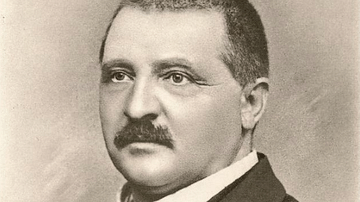Search
Did you mean: Muse?
Search Results

Definition
Anton Bruckner
Anton Bruckner (1824-1896) was an Austrian composer, most famous for his nine grand symphonies and his church music. Never quite gaining full recognition for his work until he was in his sixties, Bruckner's music, with its strong spiritual...

Article
Mesopotamian City Laments - Suffering And The Will Of The Gods
The question "Why do bad things happen to good people?" has been asked for millennia, probably since before writing was invented, but at least since circa 1700 BCE when the Sumerian (and later Babylonian) poem, Ludlul-Bel-Nemeqi (also known...

Article
Scribes in Ancient Mesopotamia
Scribes in ancient Mesopotamia were highly educated individuals trained in writing and reading on diverse subjects. Initially, their purpose was in recording financial transactions through trade, but in time, they were integral to every aspect...

Article
Mesopotamian Education
Mesopotamian education was invented by the Sumerians following the creation of writing c. 3500 BCE. The earliest schools were attached to temples but later established in separate buildings in which the scribes of ancient Mesopotamia learned...

Article
The Legend of Sargon of Akkad
The Legend of Sargon of Akkad (c. 2300 BCE) is an Akkadian work from Mesopotamia understood as the autobiography of Sargon of Akkad (Sargon the Great, r. 2334-2279 BCE), founder of the Akkadian Empire. The earliest copy is dated to the 7th...

Article
Love, Sex, and Marriage in Ancient Egypt
Although marriages in ancient Egypt were arranged for communal stability and personal advancement, there is evidence that romantic love was as important to the people as it is to those in today. Romantic love was a popular theme for poetry...

Article
The Roman Baths in Bath- A Deep Dive into Britain’s Ancient History
Bath, the famous spa town in Somerset England, has attracted people from near and far for centuries to its healing springs and baths. Today the city is known for its beautiful Georgian architecture and as the destination for the wealthy elite...

Article
Dialogue of Pessimism
The Dialogue of Pessimism (c. 1000 BCE) is a Babylonian poem featuring a master and his slave in ten exchanges during which the master proposes an action, and the slave gives reasons for and against its pursuit. The piece has been interpreted...

Article
Ruth & Naomi
The story of Ruth and Naomi is found in the book of Ruth in the Jewish Scriptures. The Scriptures are traditionally divided into three sections: Torah (the first five books assigned to Moses), the Prophets (Nevi’im), and Writings (Ketuvim...

Video
King Tutankhamun and the Discovery of His Tomb
King Tutankhamun (or King Tut as he is known) spent the early years of his life with the name Tutankhaten and was born in the eleventh year of the reign of his father Pharaoh Amenhotep IV, who is better known as Akhenaten. While he was a...